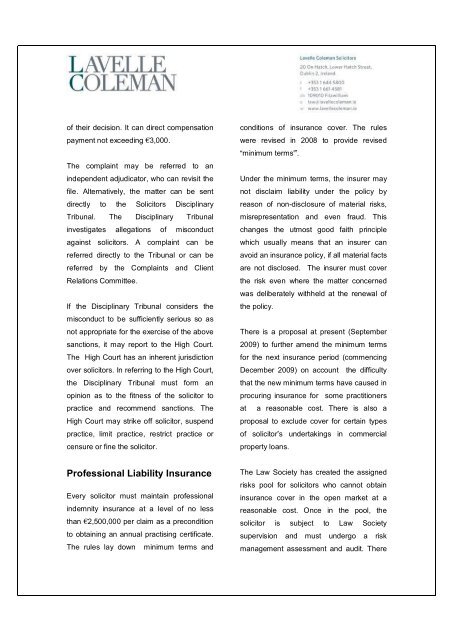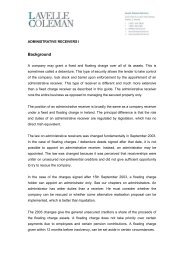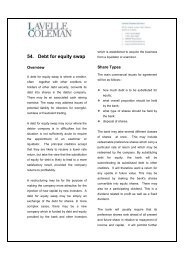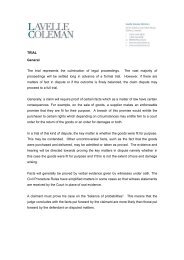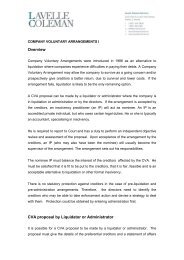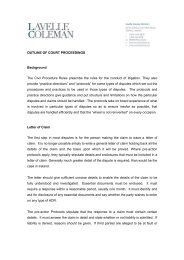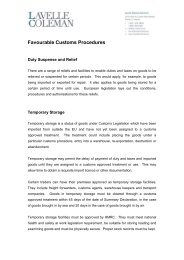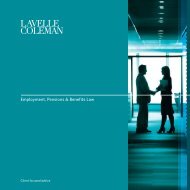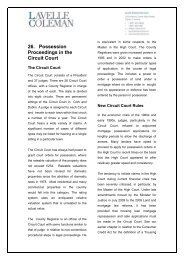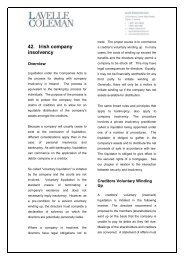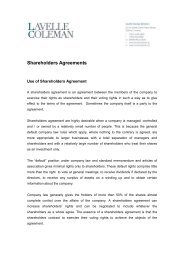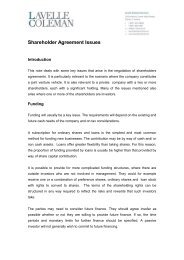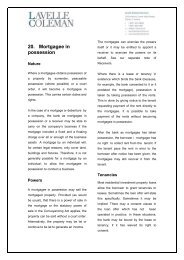45. Negligence and Breach of Duty Claims - Lavelle Coleman
45. Negligence and Breach of Duty Claims - Lavelle Coleman
45. Negligence and Breach of Duty Claims - Lavelle Coleman
You also want an ePaper? Increase the reach of your titles
YUMPU automatically turns print PDFs into web optimized ePapers that Google loves.
<strong>of</strong> their decision. It can direct compensation<br />
payment not exceeding 3,000.<br />
The complaint may be referred to an<br />
independent adjudicator, who can revisit the<br />
file. Alternatively, the matter can be sent<br />
directly to the Solicitors Disciplinary<br />
Tribunal. The Disciplinary Tribunal<br />
investigates allegations <strong>of</strong> misconduct<br />
against solicitors. A complaint can be<br />
referred directly to the Tribunal or can be<br />
referred by the Complaints <strong>and</strong> Client<br />
Relations Committee.<br />
If the Disciplinary Tribunal considers the<br />
misconduct to be sufficiently serious so as<br />
not appropriate for the exercise <strong>of</strong> the above<br />
sanctions, it may report to the High Court.<br />
The High Court has an inherent jurisdiction<br />
over solicitors. In referring to the High Court,<br />
the Disciplinary Tribunal must form an<br />
opinion as to the fitness <strong>of</strong> the solicitor to<br />
practice <strong>and</strong> recommend sanctions. The<br />
High Court may strike <strong>of</strong>f solicitor, suspend<br />
practice, limit practice, restrict practice or<br />
censure or fine the solicitor.<br />
conditions <strong>of</strong> insurance cover. The rules<br />
were revised in 2008 to provide revised<br />
minimum terms'.<br />
Under the minimum terms, the insurer may<br />
not disclaim liability under the policy by<br />
reason <strong>of</strong> non-disclosure <strong>of</strong> material risks,<br />
misrepresentation <strong>and</strong> even fraud. This<br />
changes the utmost good faith principle<br />
which usually means that an insurer can<br />
avoid an insurance policy, if all material facts<br />
are not disclosed. The insurer must cover<br />
the risk even where the matter concerned<br />
was deliberately withheld at the renewal <strong>of</strong><br />
the policy.<br />
There is a proposal at present (September<br />
2009) to further amend the minimum terms<br />
for the next insurance period (commencing<br />
December 2009) on account the difficulty<br />
that the new minimum terms have caused in<br />
procuring insurance for some practitioners<br />
at a reasonable cost. There is also a<br />
proposal to exclude cover for certain types<br />
<strong>of</strong> solicitors undertakings in commercial<br />
property loans.<br />
Pr<strong>of</strong>essional Liability Insurance<br />
Every solicitor must maintain pr<strong>of</strong>essional<br />
indemnity insurance at a level <strong>of</strong> no less<br />
than 2,500,000 per claim as a precondition<br />
to obtaining an annual practising certificate.<br />
The rules lay down minimum terms <strong>and</strong><br />
The Law Society has created the assigned<br />
risks pool for solicitors who cannot obtain<br />
insurance cover in the open market at a<br />
reasonable cost. Once in the pool, the<br />
solicitor is subject to Law Society<br />
supervision <strong>and</strong> must undergo a risk<br />
management assessment <strong>and</strong> audit. There


